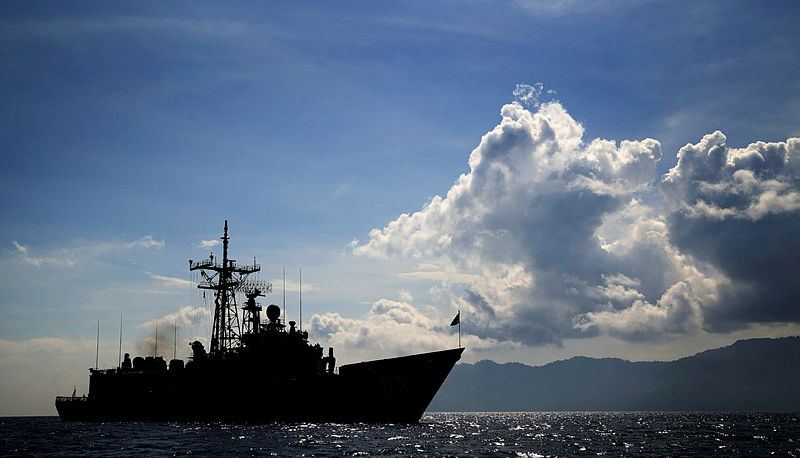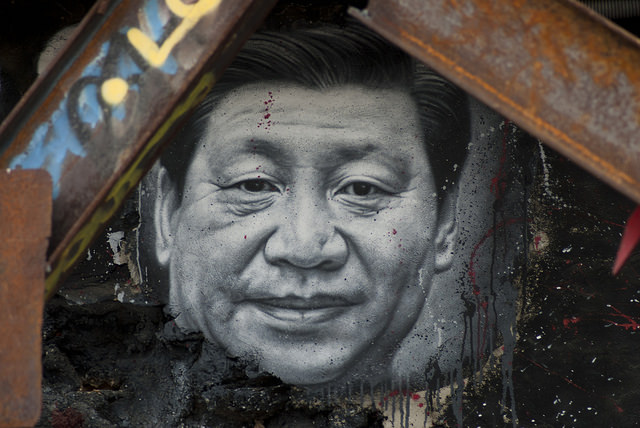An underappreciated strategic option in North Asia

Continued Chinese maritime ‘gray zone’ aggression in the South China Sea (as well as further afield) requires that Australia make strategic choices now to avoid being militarily dominated or economically marginalised by Beijing in the future.
China is Australia’s largest trading partner, accounting for more than 25% of Australia’s total export market. The recently-concluded China–Australia Free Trade Agreement means that Australia has unprecedented access to Chinese markets for its agricultural produce, natural resource extraction industries and a range of service offerings. If Australia’s only concern was maintaining or expanding current levels of economic activity between the two countries, the question of whether or not to conduct a freedom of navigation operation in the South China Sea would be self-evident.
But Australia has much more at stake than balance sheets, and therefore a more problematic set of choices to confront. The greatest challenge for the Turnbull Government and its successors is how to create manoeuvre space between the two superpowers and thus avoid the fate of either tributary state or ‘expendable ally’.
Conducting ‘FONOPs with Australian characteristics’ risks alienating both China and the US—not the worst outcome but certainly not a desirable one. On the other hand, the choice to abandon ANZUS would almost certainly bring short-term economic benefits to Australia. As Chinese economic influence grew, however, it would bring with it unacceptably high levels of coercion against such core Australian values as freedom of expression, defence of human rights and the rule of law. Similarly, although a majority of Australians support the US alliance, only a minority advocate making Australia a wholly-owned subsidiary of US geostrategic policy.
There is a third path forwards. Australia can retain its freedom of action, maintain cordial relations with both China and the US, and enhance its influence in the region by deepening its ties to South Korea in the same way it has already done so with Japan. The 2014 Korea–Australia Free Trade Agreement (KAFTA) is producing positive results for Australia, including an annual trade surplus in excess of $10 billion. Building on the foundation of the ‘2+2’ meetings of foreign and defence ministers of the two nations, Australia needs to market itself as a valuable and value-added partner. There are good reasons for doing so.
First, both Australia and South Korea are ‘middle’ powers whose economies play a significant role in in East Asia. China is South Korea’s largest overseas trade partner, a status that President Park Geun-hye seeks to protect despite a growing number of challenges to the overall relationship. She’s smart to do so; no matter how or when Korean reunification occurs, China’s support will be decisive to success. Although less dependent diplomatically on China than Korea, Australia is just as intertwined with China economically. Expanded commercial ties with Korea are desirable in and of themselves, and would mitigate the effects of potential Chinese retaliation in the future (e.g., when Australia affirms the anticipated Permanent Court of Arbitration ruling in favour of the Philippines and against China).
Second, Australia has a vested interest in regional stability. North Korea’s increasingly erratic bellicosity cannot be ignored. The 2015 Blueprint for Defence and Security Cooperation Between Australia and the Republic of Korea calls for increased ADF participation in both tactical training and operational exercises inside South Korea. It’s vital that the ADF embrace this. In particular, the ADF must follow the example of the US Army Pacific’s Pacific Pathways program and rehearse the entire deployment process from alert through integration and tactical employment. The requirements for placing forces in harm’s way while maintaining their fighting ability are seldom addressed adequately during routine bilateral exercises (which tend to focus on tactical interoperability), but military forces that neglect that aspect of readiness do so at their own peril.
Third, growing the defence relationship with South Korea demonstrates value to the US in a way that complements ANZUS while lowering the potential threat to Australia’s relationship with China. A sudden collapse of the North Korean regime isn’t out of the question. A new ‘K Force’ might be required—not for combat but to respond to a humanitarian assistance or area security requirement following the departure or destruction of the Kim regime. Should the DPRK actually initiate hostilities, both South Korea and Australia could leverage their mutual specialty in maritime security to guard against DPRK submarines (the ones that don’t sink themselves) and sea-borne infiltration of special operations forces. Given Australia’s current relationship with Beijing and a propensity to act independently when desired, an Australian Army presence north of the 38th Parallel in support of ROK forces might be more palatable to China than a cross-border operation by a reinforced Eighth US Army. Finally, the deployment of the ADF to a Korean contingency could satisfy US expectations vis-à-vis ANZUS. That would allow Australia to avoid an overt clash with Beijing should the US find itself embroiled in simultaneous military crises in Korea and the South China Sea.
An enhanced Australia–Republic of Korea relationship is neither a new suggestion nor limited to economics and defence. The Turnbull government should seize this opportunity now. Doing so allows the government to remain faithful to the spirit and letter of the Defence White Paper and the traditional close association with the US while navigating an independent course in regional affairs.








